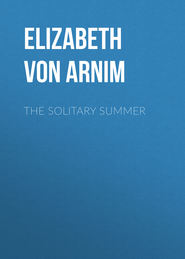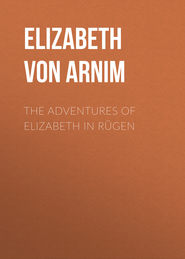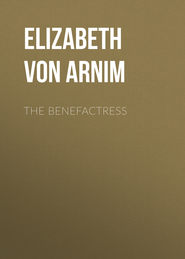По всем вопросам обращайтесь на: info@litportal.ru
(©) 2003-2024.
✖
Elizabeth and Her German Garden
Настройки чтения
Размер шрифта
Высота строк
Поля
Then an apprentice came by, a youth who had often seen me busily digging, and noticing the unusual tears, and struck perhaps by the difference between my garden and the profusion of splendour all around, paused with his barrow on the path in front of me, and remarked that nobody could expect to get blood out of a stone. The apparent irrelevance of this statement made me weep still louder, the bitter tears of insulted sorrow; but he stuck to his point, and harangued me from the path, explaining the connection between north walls and tulips and blood and stones till my tears all dried up again and I listened attentively, for the conclusion to be drawn from his remarks was plainly that I had been shamefully taken in by the head gardener, who was an unprincipled person thenceforward to be for ever mistrusted and shunned. Standing on the path from which the kindly apprentice had expounded his proverb, this scene rose before me as clearly as though it had taken place that very day; but how different everything looked, and how it had shrunk! Was this the wide orchard that had seemed to stretch away, it and the sloping field beyond, up to the gates of heaven? I believe nearly every child who is much alone goes through a certain time of hourly expecting the Day of Judgment, and I had made up my mind that on that Day the heavenly host would enter the world by that very field, coming down the slope in shining ranks, treading the daffodils under foot, filling the orchard with their songs of exultation, joyously seeking out the sheep from among the goats. Of course I was a sheep, and my governess and the head gardener goats, so that the results could not fail to be in every way satisfactory. But looking up at the slope and remembering my visions, I laughed at the smallness of the field I had supposed would hold all heaven.
Here again the cousins had been at work. The site of my garden was occupied by a rockery, and the orchard grass with all its treasures had been dug up, and the spaces between the trees planted with currant bushes and celery in admirable rows; so that no future little cousins will be able to dream of celestial hosts coming towards them across the fields of daffodils, and will perhaps be the better for being free from visions of the kind, for as I grew older, uncomfortable doubts laid hold of my heart with cold fingers, dim uncertainties as to the exact ultimate position of the gardener and the governess, anxious questionings as to how it would be if it were they who turned out after all to be sheep, and I who—? For that we all three might be gathered into the same fold at the last never, in those days, struck me as possible, and if it had I should not have liked it.
“Now what sort of person can that be,” I asked myself, shaking my head, as I contemplated the changes before me, “who could put a rockery among vegetables and currant bushes? A rockery, of all things in the gardening world, needs consummate tact in its treatment. It is easier to make mistakes in forming a rockery than in any other garden scheme. Either it is a great success, or it is great failure; either it is very charming, or it is very absurd. There is no state between the sublime and the ridiculous possible in a rockery.” I stood shaking my head disapprovingly at the rockery before me, lost in these reflections, when a sudden quick pattering of feet coming along in a great hurry made me turn round with a start, just in time to receive the shock of a body tumbling out of the mist and knocking violently against me.
It was a little girl of about twelve years old.
“Hullo!” said the little girl in excellent English; and then we stared at each other in astonishment.
“I thought you were Miss Robinson,” said the little girl, offering no apology for having nearly knocked me down. “Who are you?”
“Miss Robinson? Miss Robinson?” I repeated, my eyes fixed on the little girl’s face, and a host of memories stirring within me. “Why, didn’t she marry a missionary, and go out to some place where they ate him?”
The little girl stared harder. “Ate him? Marry? What, has she been married all this time to somebody who’s been eaten and never let on? Oh, I say, what a game!” And she threw back her head and laughed till the garden rang again.
“O hush, you dreadful little girl!” I implored, catching her by the arm, and terrified beyond measure by the loudness of her mirth. “Don’t make that horrid noise—we are certain to be caught if you don’t stop–”
The little girl broke off a shriek of laughter in the middle and shut her mouth with a snap. Her eyes, round and black and shiny like boot buttons, came still further out of her head. “Caught?” she said eagerly. “What, are you afraid of being caught too? Well, this is a game!” And with her hands plunged deep in the pockets of her coat she capered in front of me in the excess of her enjoyment, reminding me of a very fat black lamb frisking round the dazed and passive sheep its mother.
It was clear that the time had come for me to get down to the gate at the end of the garden as quickly as possible, and I began to move away in that direction. The little girl at once stopped capering and planted herself squarely in front of me. “Who are you?” she said, examining me from my hat to my boots with the keenest interest.
I considered this ungarnished manner of asking questions impertinent, and, trying to look lofty, made an attempt to pass at the side.
The little girl, with a quick, cork-like movement, was there before me.
“Who are you?” she repeated, her expression friendly but firm. “Oh, I—I’m a pilgrim,” I said in desperation.
“A pilgrim!” echoed the little girl. She seemed struck, and while she was struck I slipped past her and began to walk quickly towards the door in the wall. “A pilgrim!” said the little girl, again, keeping close beside me, and looking me up and down attentively. “I don’t like pilgrims. Aren’t they people who are always walking about, and have things the matter with their feet? Have you got anything the matter with your feet?”
“Certainly not,” I replied indignantly, walking still faster. “And they never wash, Miss Robinson says. You don’t either, do you?”
“Not wash? Oh, I’m afraid you are a very badly brought-up little girl—oh, leave me alone—I must run—”
“So must I,” said the little girl, cheerfully, “for Miss Robinson must be close behind us. She nearly had me just before I found you.” And she started running by my side.
The thought of Miss Robinson close behind us gave wings to my feet, and, casting my dignity, of which, indeed, there was but little left, to the winds, I fairly flew down the path. The little girl was not to be outrun, and though she panted and turned weird colours, kept by my side and even talked. Oh, I was tired, tired in body and mind, tired by the different shocks I had received, tired by the journey, tired by the want of food; and here I was being forced to run because this very naughty little girl chose to hide instead of going in to her lessons.
“I say—this is jolly—” she jerked out.
“But why need we run to the same place?” I breathlessly asked, in the vain hope of getting rid of her. “Oh, yes—that’s just—the fun. We’d get on—together—you and I—”
“No, no,” said I, decided on this point, bewildered though I was.
“I can’t stand washing—either—it’s awful—in winter—and makes one have—chaps.”
“But I don’t mind it in the least,” I protested faintly, not having any energy left.
“Oh, I say!” said the little girl, looking at my face, and making the sound known as a guffaw. The familiarity of this little girl was wholly revolting.
We had got safely through the door, round the corner past the radishes, and were in the shrubbery. I knew from experience how easy it was to hide in the tangle of little paths, and stopped a moment to look round and listen. The little girl opened her mouth to speak. With great presence of mind I instantly put my muff in front of it and held it there tight, while I listened. Dead silence, except for the laboured breathing and struggles of the little girl.
“I don’t hear a sound,” I whispered, letting her go again. “Now what did you want to say?” I added, eyeing her severely.
“I wanted to say,” she panted, “that it’s no good pretending you wash with a nose like that.”
“A nose like that! A nose like what?” I exclaimed, greatly offended; and though I put up my hand and very tenderly and carefully felt it, I could find no difference in it. “I am afraid poor Miss Robinson must have a wretched life,” I said, in tones of deep disgust.
The little girl smiled fatuously, as though I were paying her compliments. “It’s all green and brown,” she said, pointing. “Is it always like that?”
Then I remembered the wet fir tree near the gate, and the enraptured kiss it had received, and blushed.
“Won’t it come off?” persisted the little girl.
“Of course it will come off,” I answered, frowning.
“Why don’t you rub it off?”
Then I remembered the throwing away of the handkerchief, and blushed again.
“Please lend me your handkerchief,” I said humbly, “I—I have lost mine.”
There was a great fumbling in six different pockets, and then a handkerchief that made me young again merely to look at it was produced. I took it thankfully and rubbed with energy, the little girl, intensely interested, watching the operation and giving me advice. “There—it’s all right now—a little more on the right—there—now it’s all off.”
“Are you sure? No green left?” I anxiously asked.
“No, it’s red all over now,” she replied cheerfully. “Let me get home,” thought I, very much upset by this information, “let me get home to my dear, uncritical, admiring babies, who accept my nose as an example of what a nose should be, and whatever its colour think it beautiful.” And thrusting the handkerchief back into the little girl’s hands, I hurried away down the path. She packed it away hastily, but it took some seconds for it was of the size of a small sheet, and then came running after me. “Where are you going?” she asked surprised, as I turned down the path leading to the gate.
“Through this gate,” I replied with decision.
“But you mustn’t—we’re not allowed to go through there–”
So strong was the force of old habits in that place that at the words not allowed my hand dropped of itself from the latch; and at that instant a voice calling quite close to us through the mist struck me rigid.
“Elizabeth! Elizabeth!” called the voice, “Come in at once to your lessons—Elizabeth! Elizabeth!”
“It’s Miss Robinson,” whispered the little girl, twinkling with excitement; then, catching sight of my face, she said once more with eager insistence, “Who are you?”
“Oh, I’m a ghost!” I cried with conviction, pressing my hands to my forehead and looking round fearfully.
“Pooh,” said the little girl.
It was the last remark I heard her make, for there was a creaking of approaching boots in the bushes, and seized by a frightful panic I pulled the gate open with one desperate pull, flung it to behind me, and fled out and away down the wide, misty fields.
The Gotha Almanach says that the reigning cousin married the daughter of a Mr. Johnstone, an Englishman, in 1885, and that in 1886 their only child was born, Elizabeth.
November 20th.—Last night we had ten degrees of frost (Fahrenheit), and I went out the first thing this morning to see what had become of the tea-roses, and behold, they were wide awake and quite cheerful—covered with rime it is true, but anything but black and shrivelled. Even those in boxes on each side of the verandah steps were perfectly alive and full of buds, and one in particular, a Bouquet d’Or, is a mass of buds, and would flower if it could get the least encouragement. I am beginning to think that the tenderness of tea-roses is much exaggerated, and am certainly very glad I had the courage to try them in this northern garden. But I must not fly too boldly in the face of Providence, and have ordered those in the boxes to be taken into the greenhouse for the winter, and hope the Bouquet d’Or, in a sunny place near the glass, may be induced to open some of those buds. The greenhouse is only used as a refuge, and kept at a temperature just above freezing, and is reserved entirely for such plants as cannot stand the very coldest part of the winter out of doors. I don’t use it for growing anything, because I don’t love things that will only bear the garden for three or four months in the year and require coaxing and petting for the rest of it. Give me a garden full of strong, healthy creatures, able to stand roughness and cold without dismally giving in and dying. I never could see that delicacy of constitution is pretty, either in plants or women. No doubt there are many lovely flowers to be had by heat and constant coaxing, but then for each of these there are fifty others still lovelier that will gratefully grow in God’s wholesome air and are blessed in return with a far greater intensity of scent and colour.
We have been very busy till now getting the permanent beds into order and planting the new tea-roses, and I am looking forward to next summer with more hope than ever in spite of my many failures. I wish the years would pass quickly that will bring my garden to perfection! The Persian Yellows have gone into their new quarters, and their place is occupied by the tearose Safrano; all the rose beds are carpeted with pansies sown in July and transplanted in October, each bed having a separate colour. The purple ones are the most charming and go well with every rose, but I have white ones with Laurette Messimy, and yellow ones with Safrano, and a new red sort in the big centre bed of red roses. Round the semicircle on the south side of the little privet hedge two rows of annual larkspurs in all their delicate shades have been sown, and just beyond the larkspurs, on the grass, is a semicircle of standard tea and pillar roses.











